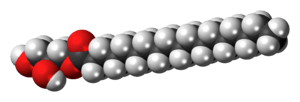Glycerol monostearate
| | |
 | |
| Names | |
|---|---|
| IUPAC name
2,3-Dihydroxypropyl octadecanoate | |
| Other names
Glyceryl monostearate Glycerin monostearate Monostearin | |
| Identifiers | |
| 123-94-4 | |
| 3D model (Jmol) | Interactive image |
| Abbreviations | GMS |
| ChEMBL | ChEMBL255696 |
| ChemSpider | 23095 |
| ECHA InfoCard | 100.004.242 |
| KEGG | D01947 |
| PubChem | 24699 |
| |
| |
| Properties | |
| C21H42O4 | |
| Molar mass | 358.56 g·mol−1 |
| Appearance | White to yellowish solid |
| Density | 0.97 g/cm3 |
| Melting point | 58 to 59 °C (136 to 138 °F; 331 to 332 K) |
| Boiling point | 238 to 239 °C (460 to 462 °F; 511 to 512 K) |
| Insoluble | |
| Hazards | |
| Flash point | 230 °C (446 °F) (open cup) |
| Except where otherwise noted, data are given for materials in their standard state (at 25 °C [77 °F], 100 kPa). | |
| | |
| Infobox references | |
Glycerol monostearate, commonly known as GMS, is an organic molecule used as an emulsifier.[1] GMS is a white, odorless, and sweet-tasting flaky powder that is hygroscopic. It is a glycerol ester of stearic acid. It occurs naturally in the body as a product of the breakdown of fats by pancreatic lipase, and is also found in fatty foods.
GMS is a food additive used as a thickening, emulsifying, anti-caking, and preservative agent; an emulsifying agent for oils, waxes, and solvents; a protective coating for hygroscopic powders; a solidifier and control release agent in pharmaceuticals; and a resin lubricant. It is also used in cosmetics and hair care products.[2]
GMS is largely used in baking preparations to add "body" to the food. It is responsible for giving ice cream and whipped cream its smooth texture. It is sometimes used as an anti-staling agent in bread.
Compendial status
References
- ↑ Jens Birk Lauridsen (1976). "Food emulsifiers: Surface activity, edibility, manufacture, composition, and application". Journal of the American Oil Chemists' Society. 53 (6): 400–407. doi:10.1007/BF02605731.
- ↑ Glycerol monostearate Cheminfo
- ↑ The British Pharmacopoeia Secretariat (2009). "Index, BP 2009" (PDF). Archived from the original (PDF) on 11 April 2009. Retrieved 18 March 2010.